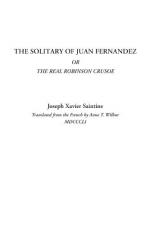‘Marimonda!’
And Marimonda runs at her master’s voice, changes, on seeing him, her cries of distress for cries of joy, leaps and gambols on the edge of the cavity, and, quickly finding a way to join him, suspends herself by her tail to one of the branches on the verge, and springs to his side.
Then contortions, caresses, winks of the eyes, motions of the head, whining, whistling, succeed each other; she rolls before him, embraces him closely, seeking by every method to supply the place of that speech which alone is wanting, and which she almost seems to have. Good Marimonda! her humid and shivering skin, her bruised and bleeding feet, her in-flamed eyes, plainly tell Selkirk how long she has been in search of him, how she has watched, run, to find him, and, not finding him, what she has suffered at his absence.
Her first transports over, by his pale complexion, by his dim eye, she quickly divines that it is want of food which has reduced him to this condition. Swift as a bird she climbs the sides of the tunnel; she repeatedly goes and returns, bringing each time fruits and canes full of savory and refreshing liquid. It is precisely the usual hour for their first repast, and once more they can partake of it together.
Revived by this repast, by the sight of his companion in exile, Selkirk recovers his ideas of life and liberty. This abyss, from which she ascends with so much facility, who knows but with her aid he may be able in his turn to leave it? He remembers his lasso; he puts one end of it into Marimonda’s hand. It is now necessary that she should fix it to some projection of the rock, some strong shrub, which may serve as a point of support.
It was perhaps presuming too much on the intelligence which nature has bestowed on the race of monkeys. At her master’s orders, Marimonda would seize the end of the cord, then immediately abandon it, as she needed entire freedom of motion to enable her to scale the walls of the tunnel.
After several ineffectual attempts, Selkirk, as a last resort, decided to encircle Marimonda with the noose of the lasso, and, by a gesture, to send her towards those heights where he was so impatient to join her.
She departs, dragging after her the chain, of which he holds the other extremity: this chain, the only bridge thrown for him between the abyss and the port of safety, between life and death!
With what anxiety he observes, studies its oscillations! Several times he draws it towards him, and each time, as if in reply to his summons, Marimonda suddenly re-appears at the brow of the precipice, preparing to re-descend; but he repulses her with his voice and gestures, and when these methods are insufficient,—when Marimonda, exhausted with lassitude, seated on the verge of the tunnel, persists in remaining motionless, he has recourse to projectiles. To compel her to second him in his work, the possible realization of which he himself scarcely comprehends, he throws at her some fragments of stone detached from his rocky wall, and even the remains of that repast for which he is indebted to her. Even when she is at a distance, informed by the movements of the lasso of the direction she has taken, he pursues her still.




